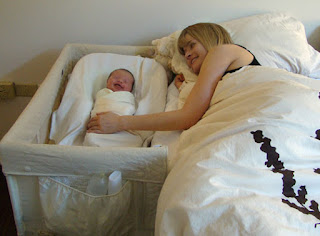Working with infants, I hear all the different options
parent choose for their child’s sleep. These
options include solitary sleep (a child sleeping alone in a crib), and
co-sleeping. Co-sleeping can be any
number of things. There are 3-sided cribs
called co-sleepers that sit up against the side of the parents bed so baby is
safe, but only an arm’s length away from mom.
There is also co-sleeping that involves actually allowing the infant to
sleep in the bed with the parents (this is highly
unsafe and I do not recommend
it).
 | |
| Co-Sleeper |
My best experiences with infants and their sleep have been
with parents who use solitary-sleep methods (a child sleeping alone in his or
her crib). This is not to say that there
aren’t benefits to co-sleeping. Co-sleeping
provides great benefits to the parents, especially the mother if she is nursing,
as well as benefits to the baby having mother very close. This type of sleeping can be very helpful to
the mental state of mom’s with babies that wake frequently in the night to
feed. My most memorable experience with
a family that used a co-sleeper, was centered around the child’s inability to
nap. We came to realize that the child
was sleeping in a co-sleeper at home, and was used to having someone next to her
at all times. This affected her napping
at day care in a negative manner.
Along the lines of my research project, I found a research
article that compares the sleep of co-sleeping and solitary-sleeping infants
(Mao, Burnham, Goodlin-Jones, Gaylor, & Anders, 2004). They analyzed the sleeping and waking
patterns of infants 3-15 months old in both settings. What they found did not surprise me. They found that infants who used
solitary-sleeping methods spent more time asleep AND woke up fewer times during
the night than co-sleeping infants.
This article is exciting to me because it gives me research
to back up what I believe. I plan on
printing a few copies of this article and adding them to a binder of resources
for parents that I keep in my room.
Reference:
Mao, A., Burnham, M. M., Goodlin-Jones, B. J., Gaylor, E.
E., Anders, T. F. (2004). A Comparison
of the Sleep-Wake Patterns of Cosleeping and Solitary-Sleeping Infants. Child
Psychiatry and Human Development, 35(2), 95-106.

I am extremely excited about this research!!!! You must be conducting this research just for me!!!Currently, I am co sleeping with my infant. I actually own the co-sleeper pictured and is where my son sleeps at night.
ReplyDeleteThe results of the study was very interesting and informational. I would think that the babies who co-sleep would sleep better than the ones who didnt. Thank you so much for sharing. This definitely gives me something to think about.
This is an interesting read. Although I am not a mother I often read and hear debates about co-sleeping vs. solitary sleeping. Just a few weeks ago I babysat my line sisters 3 month on and he co-slept with us, meaning in the middle of us in the bed. I noticed he slept well but I did not. His mother said he sleeps in his own crib in his own room at home however with us we were unsuccessful in getting him to sleep in his travel crib. This gives me something to think about whenever the times comes for me!!! Thanks for sharing!
ReplyDeleteRene, I really enjoyed reading your post. This is a very interesting topic that can benefit mothers all over that struggle with whether or not it is helpful or harmful to cosleep with their infant. I know that you will do a great job as you continue your research. Great post and thanks for sharing.
ReplyDelete